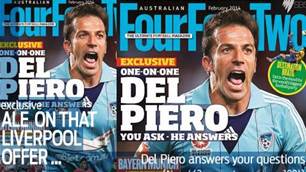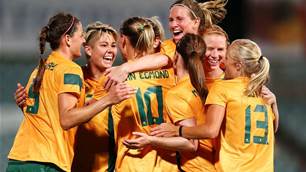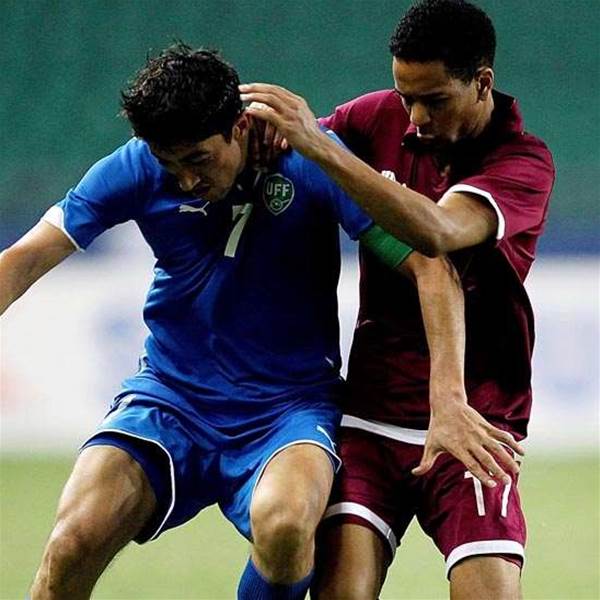HOST nation Qatar will be hopeful of progression if they can get the better of improving Uzbekistan, underachieving China and a Kuwaiti team which managed to defeat Australia. The hosts and the Uzbeks are favourites but if China find form the group could run closer than expected.
Qatar
During the first seven Asian Cups dating back to 1956, the host nation had won five tournaments. However, with the one-off exception of Japan in 1992, every other Asian Cup since 1980 has been taken home by a visiting nation. Qatar will be looking to buck that trend in 2011.
Any manner of host nation advantage paid no dividend when the Middle Eastern peninsula of Qatar hosted the 1988 tournament, with a single win all they could muster as they failed to progress from the group stages. However, much has happened since the late '80s and we're not just referring to the receding of Robbie Slater's ginger square top.
Qatar has used its vast wealth to strengthen its position in the world game, including a very expensively assembled 2022 World Cup bid. Money has also funnelled into their domestic competition, The Qatar Stars League (or Q-League) which, despite being based in a country of less than 1.7m people, even has a second tier, unlike Australia.
In the past that money has attracted the likes of Gabriel Batistuta, Sonny Anderson, Fernando Hierro, Frank De Boer, Marcel Desailly, Jay-Jay Okocha, Abedi Pele and World Cup winner Frank LeBoeuf, who once said "There are more stars in Qatar than in France."
As such, a Qatar national team that will mainly be made up of Q-League-based players should not be discounted for lacking the overseas stars of their rivals. Australia may have made light work of Annabi in Brisbane during 2010 World Cup qualification with a 4-0 drubbing, but it was a stalemate in the Doha return as the Socceroos got over the line to South Africa.
The famous Qatar cash flow has also been used to boost the national team by the most direct of measures - nationalising as many potential international players as they can throw money towards, such as Senegal-born defender Abdullah Koni, Brazilian midfielder Fábio César Montezine and Uruguayan Sebastian Soria.
This has developed a technically proficient side who will be familiar with each other through their joint Q-League involvement.
As for the Doha-born stars, striker Khalfan Ibrahim has a decent international goalscoring record, including a late consolation against Australia in 2008, with a reputation for producing some breathtaking finishes to boot. Fellow striker Ali Afif also has goals against the likes of Japan, Iran and Saudi Arabia to his name in recent years.
Star Man
Midfielder Sebastian Soria was born in South America, but was discovered in 2004 in the Uruguayan minor leagues by a cyclist who "knew a scout". He jumped at the chance to play in the Middle East and two years later he made his debut for Qatar and was the only player to score for his nation at the 2007 Asian Cup. Over the past two phases of World Cup qualifying he terrified Australian defences and could do the same in Group A.
The Coach
Bruno Metsu - The French Michael Bolton lookalike is back again, but this time with Qatar. He is best known by fans for his exploits with Senegal in the 2002 World Cup in Asia where he beat his home nation in the opening match and took Senegal all the way through to the quarter-finals where they were defeated by Turkey. Metsu has taken charge of Qatar for the 2011 Asian Cup and will be hoping to better the third-place finish he managed to achieve with the UAE in 2007.
FourFourTwo Predicts
Home advantage will carry them out of the group where momentum could gather towards a successful campaign. The final showpiece might prove a stretch too far though.
Uzbekistan
When the Socceroos were drawn with Uzbekistan in the final phase of 2010 World Cup qualifying, alarm bells went off at the potential banana skin of two matches against the emerging eastern Asian nation. The Uzbeks were on the rise, led by star players Server Djeparov, Alexander Geynrikh and Maksim Shatskikh, and had won six of their previous seven internationals, scoring 15 goals. A quarter-final loss to eventual finalists Saudi Arabia in the 2007 Asian Cup only served to raise expectations even higher.
However, the Uzbeks never really made it out of first gear in pursuit of South Africa, losing their first game 3-0 to Qatar before going down 1-0 to Australia in Tashkent. By the time the return leg in Sydney in April 2009 rolled around, the two teams were headed in opposite directions - Australia's win saw them on the verge of qualification to South Africa, while Uzbekistan were left to rue another qualification near-miss.
The Uzbeks are no strangers to qualification heartbreak, however. In trying to make the 2006 World Cup, they were knocked out by Bahrain after FIFA controversially ordered the first leg of the match - which Uzbekistan won 1-0 - be replayed after a refereeing mistake.
The Uzbeks complained (some say greedily), demanding a forfeit and 3-0 victory, but FIFA decreed the game should be played again. The replay ended 1-1, and with the second leg ending 0-0, the 'White Wolves' went out on the away goal rule.
Fast forward to the present day and despite having a talent-laden squad, results have not been going well leading up to the Asian Cup. Consecutive loses to Armenia, Albania and Russian side Lokomotiv Moscow were followed by a 3-3 draw away to Estonia, blushes only saved thanks to a last minute own goal by the hosts. The Uzbeks were then destroyed 4-0 by Saudi Arabia.
Despite the poor run of results, it is hard to judge the form of the side as foreign-based players such as defender Aleksey Nikolaev, midfielders Islom Inomov and Jasur Hasanov, as well as Shatskikh and Djeparov, have all been rested over the past few months. With a full squad to call on, Abramov's team should be a stronger proposition, especially with Rubin Kazan's Vagiz Galiullin sitting in midfield and the attacking triumvirate of Djeparov, Shatskikh and Geynrikh up front. The country's strong showing in this year's U20 World Cup could also mean call-ups for several young players.
Star Man
Server Djeparov, the 2008 AFC Player of the Year, is the focal point of the Uzbekistan national team. At just five feet seven, the front man is deceptively strong and makes up for his lack of height with a busy work-rate and clinical finishing. Won eight consecutive Uzbek league titles before joining FC Seoul on loan this year.
The Coach
Vadim Abramov - The former Olympic team coach took over the side after Mirdjalal Kasimov was sacked for failing to qualify for the 2010 World Cup in South Africa recently. Despite some disappointing results with the team so far, the former Lokomotiv and Traktor coach is still proving very bullish about his side's chances ahead of touching down in Qatar: "The Uzbekistan national team aim to win all the tournaments they take part in."
FourFourTwo Predicts
Where the team will be suspect is at the back, having conceded 13 goals in their last five games, but they shouldn't have too much trouble here, emerging from a group containing China, Kuwait and hosts Qatar.
Continues on next page...
Related Articles

Asian Cup - one year to go

Del Piero on that Liverpool offer













